Once or twice each week I release a ‘Substack Notes’ feature: a roundup of some of the content I’ve seen and restacked on the app.
This is my first topical Substack Notes piece. I’ve been thinking and reading a lot about feminism. I’m concerned about our birthrate, and the stability and integrity of the average marriage (and the frequency and average age of marriage), and the widespread embrace of culturally suicidal political ideas (uncontrolled and subsidized foreign migration, the removal of criminal penalties for theft and violence, the ideological enforcement which now reigns over most people, within most social institutions). I’m also concerned about the accelerating expansion of the managerial bureaucratic model within society (both in the private and public sector): the lavish funding of NGO’s and the HR-ification of private companies and the increasing burdens of regulations and taxes, many predicated on idealistic or emotional grounds (safety, equity, comfort). As it happens, feminism is central to all of these trends. I’m coming to suspect that it might be a foundational issue for our civilization. Yet I never hear these questions addressed, at all, in mainstream discourse. Nothing.
By feminism I do not mean the attitude that women should have civic equality and financial independence. They have these things already, and 95% of people are happy about it. That’s not a divisive political issue, and so it’s unrelated to what people mean by ‘feminism’ (which is divisive). I already addressed this in ‘Feminism as Entitlement - Pt. 1’:
First: I need to address the reflexive objection to any criticism of feminism. Feminism is NOT an ideology pushing for equal rights for women. That may have been the case decades ago but those rights were already won in the West. (And feminism is almost completely unconcerned with the plights of women in Africa or Asia - try finding a modern feminist organization talking about sexual inequality in African societies). These days, about equal numbers of American women have negative associations with feminism as have positive ones. Obviously, everyone has a different idea of what ‘feminsim’ means, but if feminism were really the desire for sexual equality we would have to conclude that many millions of American women don’t want sexual equality. We might conclude that… or we might allow that ‘feminism’ means a great deal besides (and, increasingly, contrary to) equality between the sexes.
Bryan Caplan:
[I]n this study, 40% of women and 67% of men did not consider themselves “feminists.” But over 90% of both genders agreed that “men and women should be social, political, and economic equals.” If Google’s definition of feminism conformed to standard English usage, these patterns would make very little sense. Imagine a world where 90% of men say they’re “bachelors,” but only 40% say they’re “unmarried.”
Subscribed
Each of my prior examples (women’s suffrage or wage equality as a principle or female empowerment are simply entitlement) really doesn’t intersect with modern feminism very much. The uncomfortable fact is that, in the West, they have all been more or less achieved. What happens to a civil rights movement once the rights are won? As it turns out, some activists do home and enjoy their rights but many radicals or borderline personalities or manipulative actors or non-profits or government programs simply cannot claim success. Their incentives are such that the problem can never really be solved, even if it is, because then they would lose money and social power and political motivation and a sense of meaning. Of course, problems are also never completely solved. There are still vastly disparate rates of inter-sexual violence against women, for example. Feminism is a modern movement should have narrowed its focus to those remaining issues, though. Instead it has transformed and shifted its focus to other issues, issues in which sexual discrimination or institutional inequality is not an obvious reality.
So: what is modern feminism? https://www.econlib.org/archives/2018/02/neutral_definit.html:
What would a non-argumentative definition of feminism look like? Ideally, feminists, non-feminists, and anti-feminists could all endorse it. If that’s asking too much, all these groups should at least be able to accept the proposed definition as a rough approximation of the position they affirm or deny. My preferred candidate:
feminism: the view that society generally treats men more fairly than women
What’s good about my definition?
First, the definition doesn’t include everyone who thinks that our society treats women unfairly to some degree. In the real world, of course, every member of every group experiences unfairness on occasion.
Second, a large majority of self-identified feminists hold the view I ascribe to them. Indeed, if someone said, “I’m a feminist, but I think society generally treats women more fairly than men,” most listeners would simply be confused.
Third, a large majority of self-identified non-feminists disbelieve the view I ascribe to feminists. If you think, “Society treats both genders equally well,” or “Society treats women more fairly than men,” you’re highly unlikely to see yourself as a feminist.
Feminism is the idea that women are especially unfairly treated or disadvantaged relative to men in our society. Its proposals therefore revolve around giving women more: more sympathy, more help, more set-asides, more status, more power. These things are not to be earned (at least not fully, or not necessarily). They’re to be given, as a kind of compensation package for life under patriarchy (or so the story goes).
Of course, asking that people give you things or leveraging sympathy, or bothering people until they let you into their club or promote you isn’t really how one wins power or respect. Feminists understand this intuitively. That is why they are so eager to remake the idea of femininity, to include confidence and leadership and aggression and risk-taking (which means pushing the perception of masculinity away from those attributes). They hope to change the very ways we think about power and respect. I don’t think that’s possible (just as it’s probably not possible to change the psychological tendencies of men and women, or their sexual preferences or intrasexual social dynamics) but the effort could do an enormous amount of damage to our society.
We’re now engaged in a vast project of pretending and we all must participate, whether we desire this and agree with it, or not. We all acknowledge that men have certain negative social tendencies (aggression, impulsivity, promiscuity, antisocial tendencies, narcissism) and certain shortcomings (no one is angling to have more male nannies or kindergarten teachers or nurses). Women are more nurturing, conscientious, empathic, and prudent (or cautious, if you like). Yet we all must pretend that women don’t have any shortcomings, and that men don’t possess their own social strengths. That’s not an exaggeration.
And we all must ignore and dismiss the negative social tendencies of womankind: gossip, coalitioning, reputational destruction, social aggression, leveraging of sympathy, borderline traits, passive aggression, emotional manipulation. And we definitely are not to question how social media might be interacting with these tendencies, or whether these behavioral patterns might be tied to a recent wave of silly and emotionalized (and therefore totally fruitless) political movements.
There are few professional women who won’t bristle at the idea that women employ emotional manipulation or leveraged sympathy in peculiarly feminine ways, and many of these same women would cry if arrested. I’m not trying to criticize women inordinately. It’s not their nature which is out of sync. It’s our cultural narratives.
You can always tell the important and useful ideas these days. They’re the things that you’re not allowed to say in an HR training. Those are generally organized and run by women, incidentally.
So, here are my Substack Notes, regarding feminism, and the things you’re not supposed to notice or remark upon. The list grows longer every day.
On James Damore, the Google engineer that was fired for his speculative open letter concerning feminist hiring practices in the company:
Feminism is a system of rigid social discipline. Foucault described the control of post-Enlightenment institutions in terms of the panopticon, a prison designed to be more humane and encourage prisoners to police each other.
Feminist theorists later used the panopticon to be a metaphor for patriarchal institutions, but they became the prisoners and wardens themselves of the Mental Prison of Feminism.
I finally had to get over the false ideas about merit I was sold: that credentials, playing by the rules, and working hard will get me what I want. I was taught these bad ideas by other women verbally and by example. And before you protest: the majority of degrees are earned by women, HR is overwhelmingly women (the first gatekeepers), higher education is largely run by women, women take the lion’s share of humanities and social science degrees, many humanities fields have more female professors than male, and women reason differently than men. We are arguably wired to follow rules, which is why we do so well in school. And rule-following does keep you stagnant.
I didn’t tell my husband I was cutting off my hair. I came home and walked into our bedroom. “Whoa,” he said. I didn’t admit to myself that I desperately wanted his approval, and was now doubting my decision. I knew he liked my long hair. He didn’t find short hair very attractive. My insistence on my new hair style, while my own decision, felt tinged with adolescent rebellion. I am woman, hear me roar!
“Do you like it?” I asked him.
“Do you like it?” he asked, which meant he didn’t like it. I burned with insecurity. I was caught between worlds: my own version of femininity and his. I became angry that he didn’t like it. I cared deeply about what he thought, but I was taught that it was bad to care what men thought, to cater to oppressive beauty standards. I couldn’t win. I was pissed off because I was a woman in a man's world, and I would never win.
By leaving Jeff out of the conversation, I had convinced myself that I was my own woman. No man was going to tell me what was what. And the fact that he was my husband, and I should care what he thinks about my appearance, never entered my mind. Jeff felt my hostility toward him, towards his maleness, but remained silent. I remained silent, too, but felt disappointed in his lack of support. He only likes me because I have long hair, I thought. He doesn’t really love me. I’d been trained to see the bad, oppressive man, and here he was.
The womanly anger I felt had been in my marriage for a while by then. We had three small kids, and though we were best friends, our attraction to each other was fraying. We didn’t know how to talk. Resentment was bubbling underneath every interaction. With Trump’s election, I felt a surge of anger and bitterness.
We’ve now reached a point at which every aspect of the system: grading, hiring, scholarships, support, sympathy, custody settlements, alimony, criminal accusations, dating, etc. etc. favors women, sometimes exorbitantly.
For those who care about ‘equity’: should these systemic disadvantages be addressed? Should men receive preferential admission to college programs or additional mental health support?
Or was this all just a game, to gain money and power by leveraging pity and guilt and sympathy? Sadly, millions of people are still playing.
A commandment against judgement and shaming and ‘stigma’ is commonly understood to be a feature of our culture, but that’s not quite right. Shaming incels and ‘bros’ and racists and bigots and Trump supporters is still encouraged. Judgement and shame have been selectively removed from anything a woman chooses to do, no matter how outlandish.
See below (Freddie de Boer):
Apparently a lot of women were waiting for a particular kind of permission that Miranda July has provided. What’s remarkable about all of this cheering on of July in our most elite publications is not just its sheer volume, but also how untouched it is by skepticism or pushback. It’s not just that a certain kind of person at a certain kind of publication wants this story told; they also don’t want to hear anyone object to it. And I think this is the “Can women have it all?” phenomenon again, where saying that a particular kind of happiness for women is genuinely unattainable is too easily represented as saying that you don’t want them to attain it.
Well, the news is good: they already had permission. Most of the Western, educated, liberal women who are devouring this #content have in fact had the ability to avoid or escape monogamy for their entire lives. This is why these pieces so often reference NORMS and SOCIETAL EXPECTATIONS and STOCKHOLM SYNDROME over and over again, because they need to create the impression that women had no choice until this new liberatory philosophy came along. And, you know, that kind of social pressure can indeed be coercive and is certainly unfortunate. Well, look: of course women have the right to end their marriages when they want to. Of course they have the right to pursue multiple partners, serially or at once. Of course they have the right to put their physical pleasure and fulfillment first. Monogamy certainly isn’t for everyone - although, if I’m being honest with you, my observations suggest that polyamory is for even fewer people. I have no doubt at all that traditional gender roles have trapped a lot of women in unhappy lives, that this is an explicitly gendered phenomenon, that sexism and misogyny conspire to turn conventional monogamy into a trap for a slice of women within it, and that some women would be happier outside of their current marriages. You had and have permission to leave your husband.
But, again, is/ought. The question is not whether women have permission to forego longstanding marriages and relationships to pursue a regular churn of sexual and romantic partners, in an effort to achieve real satisfaction and happiness. The answer to that was already yes. The more relevant question is, will the women who attempt this actually achieve satisfaction and happiness?
According to recent polling, both sexes think it’s worse for a husband than a wife to have an affair – the opposite of the traditional double standard.
By all historical understandings of patriarchy and by looking at patriarchal societies that exist now, it seems clear that the UK and the US and much of the Western world are not patriarchal. Women are no longer obliged to obey their husbands and have full legal equality with men and access to all of the public positions that men do. Yet, within feminism in particular and to some extent in wider society, the word “patriarchy” is used to describe a problem in society that still needs to be overcome. How is this justified?
Most often people point to statistics showing that men are very much over-represented in politics and business and say that this is evidence of a society ruled by men. However, there is no law that only men can access these positions and some are held by women... There is little evidence that the imbalance is due to discrimination against women rather than different choices made by men and women. Since women have had access to all professions, they have quickly come to dominate education, healthcare, publishing, and psychology. Does this make these heavily social fields, which guide how society thinks and feels, matriarchal? …
Another common argument for patriarchy is the fact that rapists and boorish men still exist. This is said to be evidence of a rape culture and is presented along with the fact that violent criminals, and particularly sex offenders, are much more often men as evidence of a society which devalues women and in which men feel entitled to abuse women. The problem with this claim is that we have a society in which violence by men against women is taken very seriously and punished more harshly than violence by men against men and much more than violence by women against anyone.
Sex differences in reading vs. science as personal academic strengths are larger in more gender-equal nations - the opposite of what we’d expect if the differences were due to strict gender roles or patriarchy.
Wiley Ballard, a sports journalist, is being dragged for what critics are calling an “unprofessional disgrace,” “insanely inappropriate,” and “GROSSSSSSS.”
CBS MLB editor Katie Feldman said: "This is one of the most insanely inappropriate things I've ever seen. Like I legitimately cannot believe it's real."
Ballard was on the air interviewing two women. With some encouragement from his colleagues, Ballard asked one of them for her phone number. She gave it to him.
I can’t believe he wasn’t arrested.
(my commentary…)
Men are supposed to be assertive and take their shot, but if you do it in the wrong way you will be pilloried. Men are supposed to earn more than their female partners (according to most women), but men OVERALL shouldn’t be earning more than women. Men are expected to be tough, and capable, and decisive, but any hint that these traits are (in any way) associated with masculinity will be a very unpopular statement in the professional world.
Sometimes it seems that half of modern culture is just a vast game of ‘pretend’. Who are we pretending for? I don’t think it’s men…
As you can see, women rate more than 80% of men as below the midpoint of the scale. In contrast, men consign less than half as many women to that cursed zone, rating 60% of women at the midpoint or above.
This isn’t just a one-off finding. One study on the dating app Tinder, for instance, found that men hit the like button on around 62% of female profiles, whereas women hit it on less than 5% of males.
These numbers and others like them fit nicely with the fact - well-documented by evolutionary psychologists - that women tend to be choosier than men about their sexual partners…
Jonathan Haidt and others also argued that more liberal girls and women are depressed or have a mental illness than conservative women. I surmise this is because political conservatism correlates with values coded as personally conservative: hard work, discipline, community, and family. These ‘conservative’ values are also crucial to living a good life. But because the values themselves are politicized as patriarchal and oppressive, liberals abandoned them entirely as part of their moral frame.
I think third-wave feminism, out of which every other intersectional paradigm grew, encourages a set of cognitive distortions that ought to be questioned and debated loudly and often. Blaming problems on capitalism, sexism, racism, and even colonialism do you no favors and puts you off from taking a hard look at changes that are begging to be made inside you as an individual. These are the only ones under your control. That is how I beat the dark parts of my brain, telling me I was worthless - I heard everyone and myself saying so under the guise of empowerment. If I can blame these unfalsifiable concepts, my behavior toward others and emotional instability isn’t my responsibility. Too often, those dark parts led me to the causes of the Left internet, and the two phenomena fed off each other.
Mental illness and political obsession are a toxic mix that makes both mental health and politics worse. The distortions become the basis of action framed as political and collectivist but is, in fact, emotional and individualist. The great culture war is one tinged by mental illness, but this isn’t named because the advertising platforms have an interest in perpetuating it. If mental illness becomes an identity, the makers of the platforms have zero responsibility for its effects.
The law of intellectual entropy in female or coed spaces
Rohan Ghostwind names something here I’ve seen repeatedly. Early in the 2010s, I was in an online group of IRL friends intended to discuss the news of the day, mostly men and five women at most. I would intensely argue, as would the other men, but there was no assumption of hostility, and we were all still friends afterward. As more women got added, the intellectual tenor of the group dropped because disagreement was coded as abusive or ‘toxic’.
The end result? A woke woman (pollster, lol) stole and reformed it without me or any of the men she saw as allied with me. Women are out there who do practice abstract thought and don’t code disagreement as hostility, but they’re exceedingly rare. There’s a reason women stay away from philosophy and it’s not sexism; it’s disinclination to value abstract thought for its own sake, and that can’t be blamed on socialization in 2025. And in case it was unclear, it is women punishing abstract thought in other women, not men. I suspect this is because many men prefer women who are intellectually oriented, leading to a competition over male attention under the surface. Vibes rule.
From the first, the machinery of this kind of celebration backed men into an impossible corner. Most men have always known that women are not as strong as they; few men want to compete against a woman in sport or elsewhere. Yet no man dared gainsay the right of any woman to show herself equal to or better than a man if she could, whatever the context. If a man refused to compete with a woman, to welcome her into his club, to hire her into his firm, to respect her in any athletic endeavor—then he was a Neanderthal and a misogynist who should be shamed, shouted down, and immediately dismissed from his job.
But a man who competes with a woman, or treats her as he would treat a man, is often in trouble too, as we are seeing now. Yes, a woman was just as good as a man, our culture has insisted, but always and only on the woman’s terms. Sometimes the woman did not wish to be treated as an equal or a competitor, and that too was her right. Men had no say in the matter.
Over the years, there have been cases in which women didn’t like the culture men had created in their places of business; didn’t like male jokes, male camaraderie, male means of competition, or male methods of evaluation. Some women felt harassed, disrespected, held to an unreasonable standard, judged too harshly, given inadequate mentoring, singled out, left too much alone, treated cruelly, looked down upon, forced to behave in ways they didn’t prefer.
In general, women like competing against men and getting praise for it, but they don’t like losing to men.
It is a story all too familiar for men in fields that have recently been forced to admit women. Some of the problems were detailed by an anonymous contributor, a military sergeant, to my book Sons of Feminism: Men Have Their Say (2018). Not only have military units in various Anglophone countries bent over backward to admit women and help them pass their training programs, including by dramatically lowering physical standards, but they hide the reality from the public and even from the women themselves, quickly promoting the women to high-profile positions where mass media attention can showcase alleged female achievement. Despite the acclaim, women’s lesser physical strength impacts everything from routine tasks to advanced training exercises.
Men in positions of leadership are well aware that failure to offer kid-glove treatment can result in career-imperiling complaints by the women. There is also a significant cost in money, time, and energy to provide special facilities, more flexible hours, gender equity oversight by designated staff, compulsory feminist training programs, and female-focused networking and career opportunities not available to the military men.
How many women have come forward to call out these inequities?
“The problem goes way beyond gender woo to basic reasoning skills”
It can’t be stressed enough that the problem with such “inclusive feminist” political sector workers transcends allegiance to gender woo; they can believe in what they want. It’s not even that they implicitly condone unhinged abuse and misogyny against women they don’t like, including in their own parties. The biggest issue is that such women can be championed as role models despite a demonstrative inability to reason logically and debate in non-fallacious, professional terms. Emma Roddick, for instance, did not behave nastily per se (that I know of) but she was promoted way beyond her experience and, without meaning to sound unkind, her intelligence. These young women are at best, vastly overestimated and, at worst, devoid of basic comprehension skills and maturity. The fact that they are young, female, and progressive should not give them a free pass. That their lack of verbal intelligence in debate is seldom called out, I can’t help but read as a depressing indication of how embarrassingly low the bar has become in terms of the intellectual rigour expected from young left-leaning women.
I am specifying left-leaning women because from where I stand, I don’t see this problem with young conservative or non-left women, quite the opposite.
You’re at a women’s empowerment event. Everyone on stage speaks fluently and eloquently. The language is crisp, the tone measured, and the slogans aligned. It’s a feminism that photographs well and aligns with the brief. One woman speaks about leaning in and radical courage. Another talks about smashing the patriarchy with an air of practiced conviction. A third delivers a polished monologue on intersectionality, never once stuttering on the right phrases. The crowd applauds.
No one asks a real question.
Everyone mingles during the reception. There are polite smiles, strategic affirmations, and knowing nods. “I love what you said about emotional labour. It’s so important!” “As someone with privilege, I wanted to amplify what she said.” A few pose for photos to share later so their followers have evidence of participation and proximity.
This is the kind of feminism that soothes, flatters, and photographs well. It’s been fully optimised for optics: curated spaces where everyone agrees, reposts each other’s talking points, and leaves feeling righteous. No one’s too challenged, but everyone’s a critically conscious changemaker.
Being a woman for me has been an unending status game based on emotional performance (pathos) and morality (ethos) in competition with other women. Logos has no place in the feminine experience; it is held with suspicion and contempt because anything masculine coded is problematic. Without logos, however, women are left to become emotionally indulgent chasing a false moral righteousness. Logos is the faculty of reason, coherence, internal order, or clarity in the fog of emotion. I climbed out of depression through the integration of logos with ethos and pathos within.
But, the competition may never be named, and feminism is invoked when I raise these concerns as an exculpatory mechanism. The competition never happens on logical terms, always emotional and moral. “Oh, she’s just got internalized misogyny” they’ll say, or “women uphold patriarchy” rather than holding these women to higher standards of behavior. The result is excusing the worst behaviors born of evolution to neutralize judgment. Feminism is about shielding women from accountability for their actions among both individuals and institutions.
Relational aggression and bullying among women involve shaming, shunning and social death in the following ways:
gossip and smear campaigns
unjustified criticism or blame, including accusations of incompetence
barring access to opportunities and a wider network
social and professional exclusion
withdrawal from friendship/professional relationship
ignoring ideas and contributions
claiming ideas and contributions, including Knowledge Vampirism
public humiliation
“…entertainment media can quietly shape public perceptions, often portraying male characters as either predatory, weak, or disposable, while sidelining the real experiences and complexities of young men.”
I’ve hinted so far that social justice activists and warriors employ narcissistic behaviours in order to further their agenda, such a sense of superiority over others. These communal narcissistic traits trap these activists/warrior/crusaders in an Injustice Cycle (see figure above) rather than liberate through their activities.
Communal narcissism, a subtype of overt narcissism, is associated with someone who is often charismatic and engaging, and who believes they are benevolent - fair, just, compassionate, generous, helpful, concerned for the wellbeing of others and the preservation of communal values, but is unable to put those behaviours into practice to have the intended impact. This person can feel entitled to self-anoint as an authority on a specific issue or the needs of a chosen vulnerable group to employ communal narcissism to gain social capital and elevate their social status.
These behaviours are present in humanitarians, medical professionals, activists, white saviours, therapists, yoga teachers, spiritual and religious community leaders, charity founders, influencers and social justice warriors who exploit their chosen group in need on their mission to save the world. This person believes they are improving the situation of a target group who is more vulnerable or disadvantaged to them while using their activities to elevate themselves in their institution or community. Sometimes this person piggybacks onto an existing initiative or enters into a collaboration, wins over the community and takes control of the initiative after the original leader or co-founder has been kicked out, disgraced, cancelled or forced to resign citing ‘irreconcilable differences’.
The Saviour requires an Oppressed (sacred victim) and an Oppressor, whether individual or group, in order to maintain their superiority over the morally inferior Oppressor and the materially inferior Victim. Ultimately, the Saviour is concerned solely with preserving their self-image and sense of superiority, since liberating anyone would render them unnecessary — a form of kryptonite to the communal narcissist. The Saviour, who requires a perpetual victim, sustains the cycle of abuse among the roles rather than being capable of liberating anyone from it.
The focus is on convincing others (and themselves) of their benevolence in a number of ways such as:
public exclamations of moral outrage to condemn unjust or unfair treatment of their chosen population
staging or posting attacks on themselves for speaking out to justify counter attacks
fuelling controversy to keep the attention on them and their cause
performative empathy toward their chosen population, feigned compassion for their enemy and simplistic explanations about how their enemy’s trauma drives oppressive behaviour
public accounts of how their work impacts on their personal life, livelihood and emotional state yet the sacrifice is worth it
recommitment to their cause or mission despite the toll on their life
proclamations of personal accountability to solve the problem
call to action for more champions.
There are a lot of ideas out there which have been established, and explored for years now. The fact that they’re not also debated or even acknowledged within elite (education/professional) circles can probably only be for two reasons:
These ideas don’t flatter the self-conceptions (both hero and victim) that many women have been encouraged to construct
These ideas might weaken the bureaucratic effort to absorb even more power. Strengthening men, strengthening families, empowering men, or even improving the mental health of women would be counterproductive to the bureaucracy’s aims.
If you have any suggestions or resources or references, please leave them in the replies.
















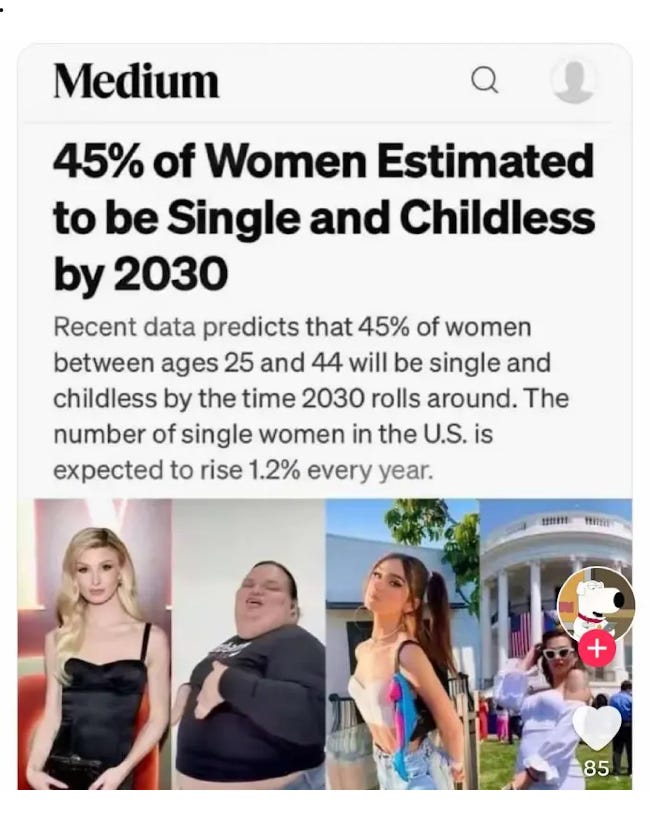
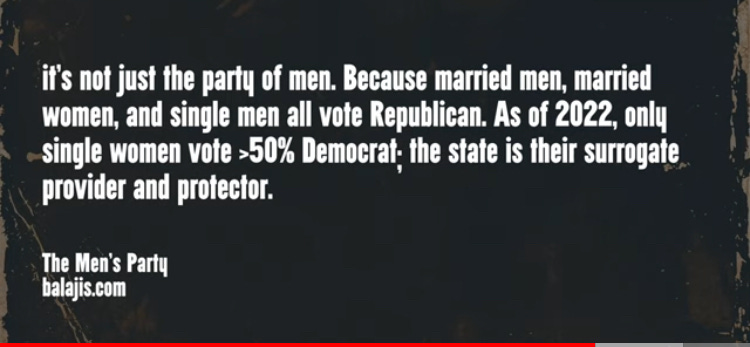

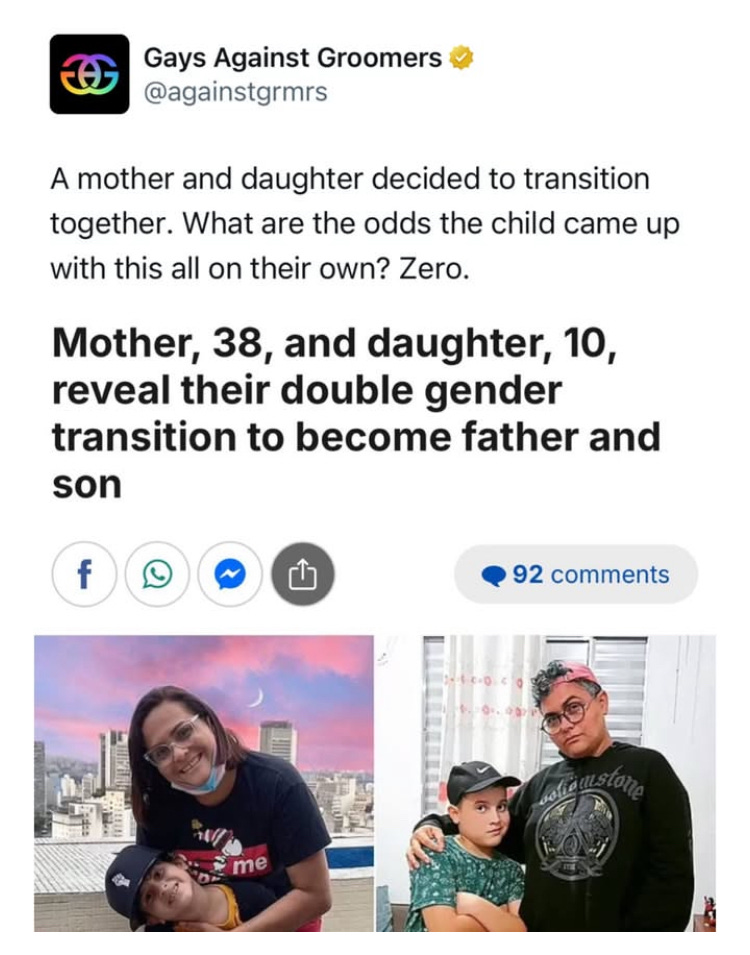

















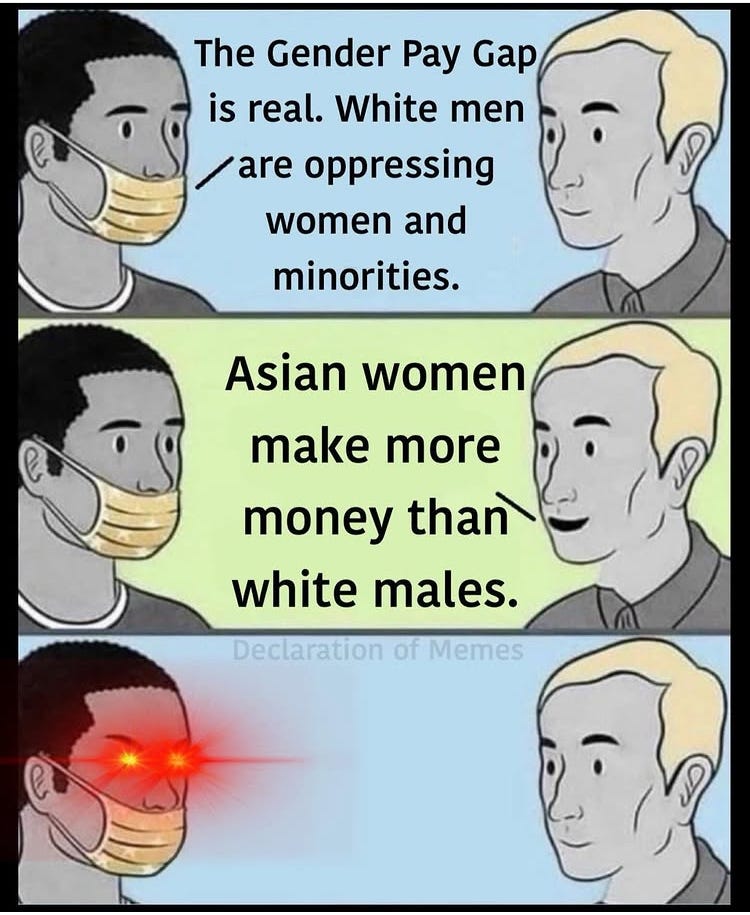
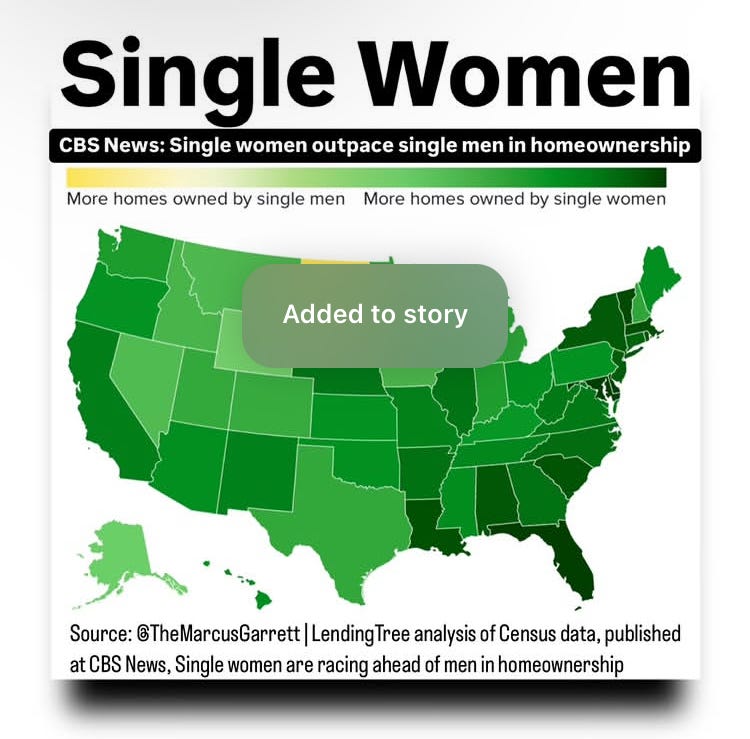




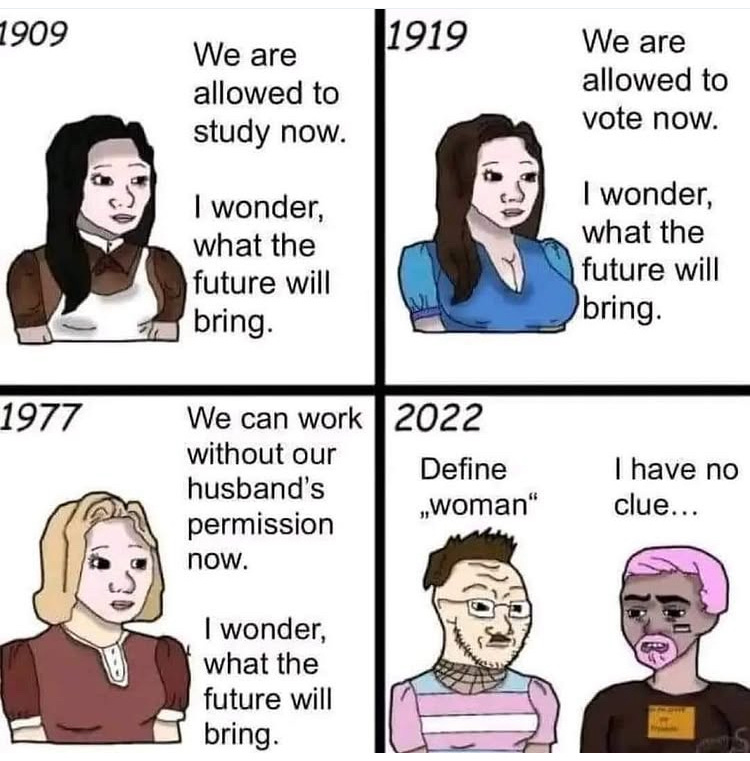



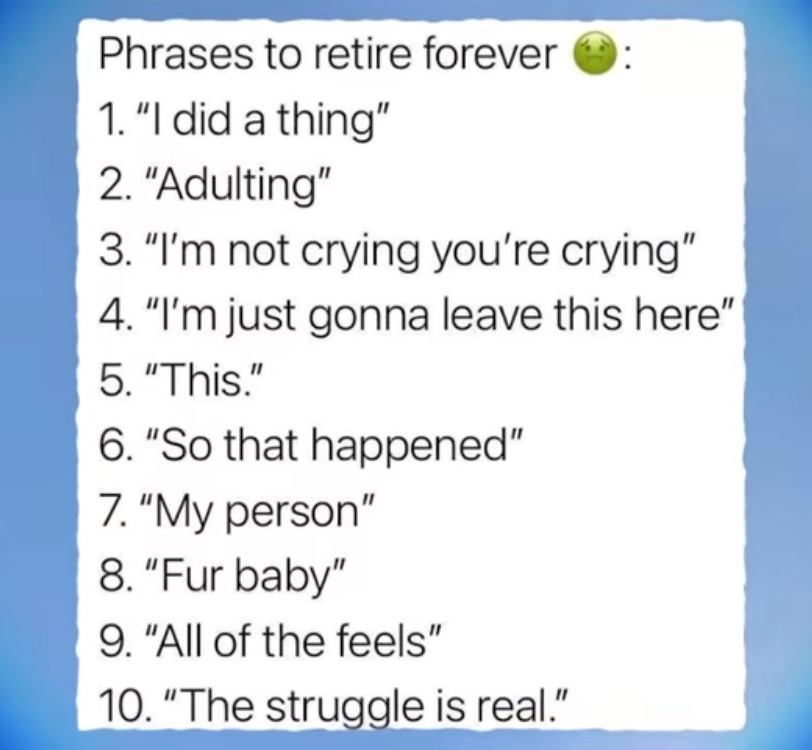









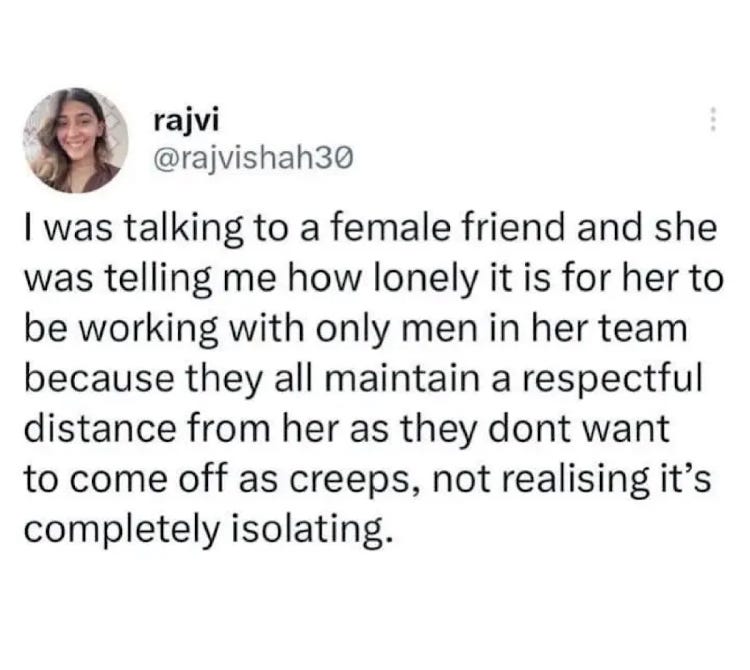


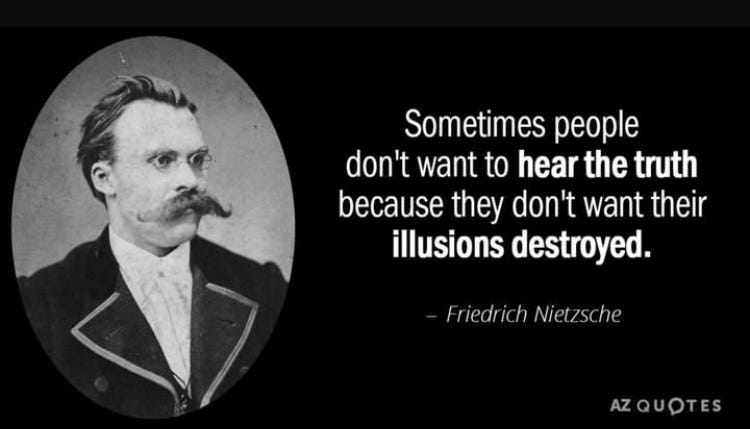
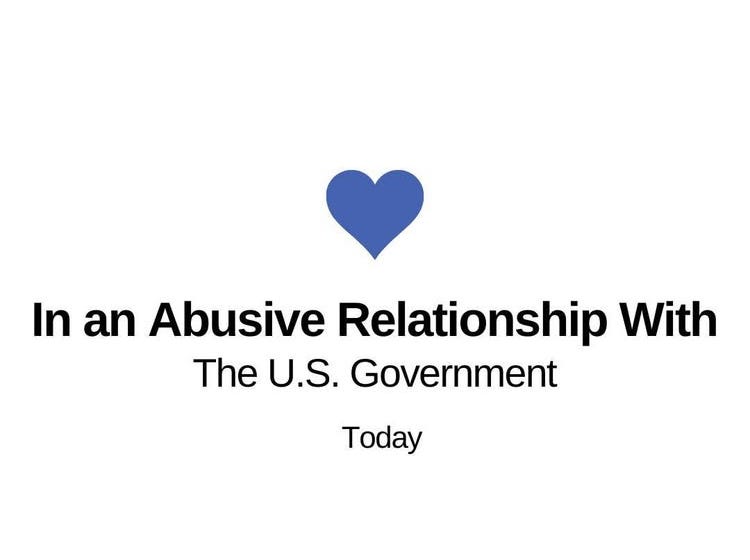
I appreciate this compendium you made and knowing that my ideas contributed to crystallizing some of these things. I appreciate the sort of intellectual triangulation you, Nathalie and I seem to have had going for some time. And I think you’re spot on, as ever.
Here’s some modern feminism from yesterday
https://www.thenation.com/article/society/supreme-court-porn-free-speech/#